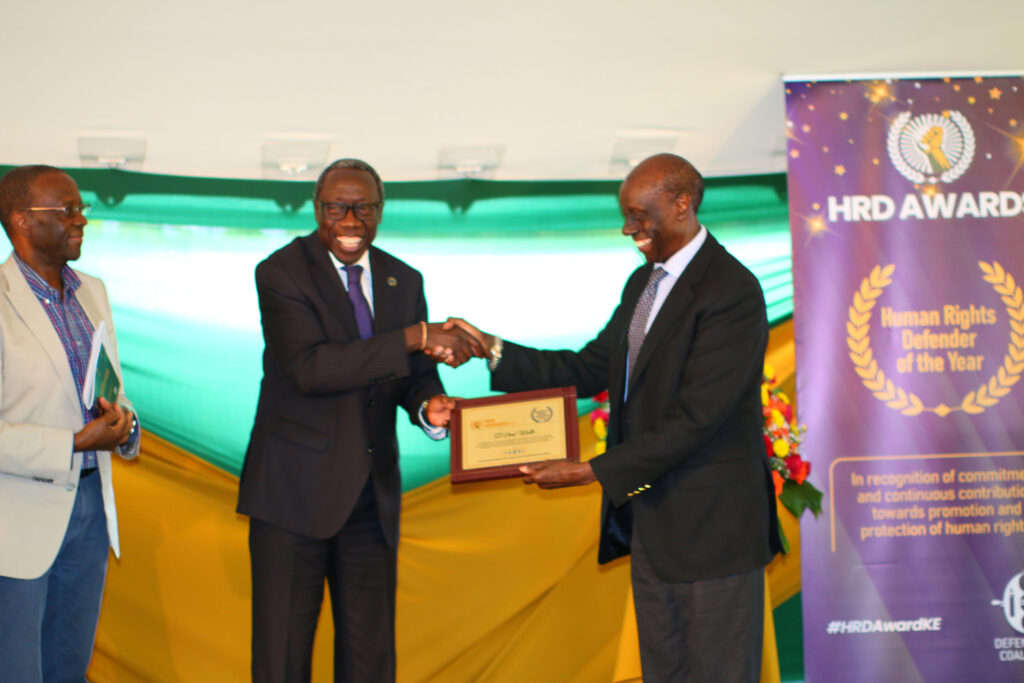
PAUL KIBUGI MUITE, S.C. IS A SENIOR LAWYER and an Advocate of the High Court of Kenya with 51 years of legal practice. He was admitted as an Advocate of the High Court of Kenya in June 1970 and signed the roll of Senior Counsel in 2003.
Paul K. Muite is an active member of the Law Society of Kenya (LSK) having served as its President in 1990/91
Muite has had a remarkable legal career characterized with a passionate and strong commitment to upholding human rights principles. Over the years he has used his expertise in constitutional law to advocate for the protection of individual liberties and justice.
During the period of the struggle, he was targeted by former President Daniel Toroitich Arap Moi and planned to flee Kenya. However, his passport was seized by the government rendering him unable to flee Kenya. He became an internal refugee as a result.
His contribution is greatly acknowledged in the “Struggle for the Second (2nd) Liberation” and the fight for multi-party democracy, where he played a key role in providing political leadership that promoted the rule of law and respect for human rights.
This struggle motivated him to push his legal skills and experience to Parliament and in 1992 he became the Kikuyu Constituency, a position he held until 2007.
During this time, he chaired both the Parliamentary Committee on Administration of Justice and Legal Affairs and the Select Committee on Constitutional Reforms. His conviction and belief in changing and influencing positive governance led him to establish the Safina party, which faced great opposition when it was first formed and it was not until 1997 when it was recognized as an official party.
Muite was a key figure in advocating for constitutional reforms in Kenya in the 1980s and 90s with his extensive legal knowledge coming in handy during the formation of Kenya’s 2010 constitution where he ensured that it reflects the principles of human rights, inclusivity, and democracy and good governance.
Paul K. Muite continues to support constitutional/democratic growth and his passion for human rights issues has distinguished him as a fearless defender of the Bill of Rights championing for minority groups rights.
Muite’s consistency in challenging oppressive regimes continues to contribute to the development of the laws that continue to advance Kenya’s current constitutional order.
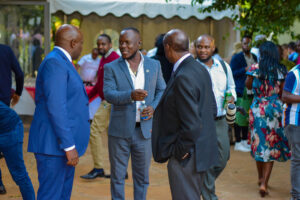

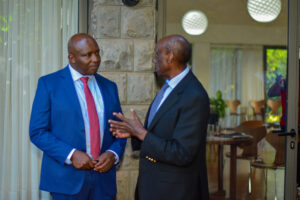
Sankara is a grassroot human defender and a member of the Ngong social justice and
Environment center. Sankara advocates for ecological and social justice. He advocates against police brutality, gender based violence, land grabbing and river pollution through influencing change in public attitudes, policies and laws to create an inclusive, clean, friendly and socially just society.
“My most notable success is the reclamation of public land that acted as a dumpsite for a period of time. The grabbing of this piece of land saw my arrest and that of a 11 other youths who come out in defense of this land. We suffered torture and atrocities for refusal to keep quite about the grabbing of this land.”
Sankara observes that environmental advocacy, especially on the land question, particularly when public land grabbing is involved, attracts severe response from the violators, in some cases, with connivance of the state agencies.
“…during my advocacy works against the violation of waste pickers rights, in line with the community land we were being evacuated from, I was arrested tortured and locked behind bars for a period of two weeks for leading protest against the grabbing of those pieces of land and standing ground against the violation of fellow youths working in this sector. I have also suffered torture, intimidation and violations including dispossession of personal items for being vocal against grabbing of public land and public spaces around Ngong.”
Sankara is an exceptional HRD who demonstrates leadership through the cultivation of diverse and inclusive workforce, continuous learning and championing toward talent development, social justice and ecological justice initiative.
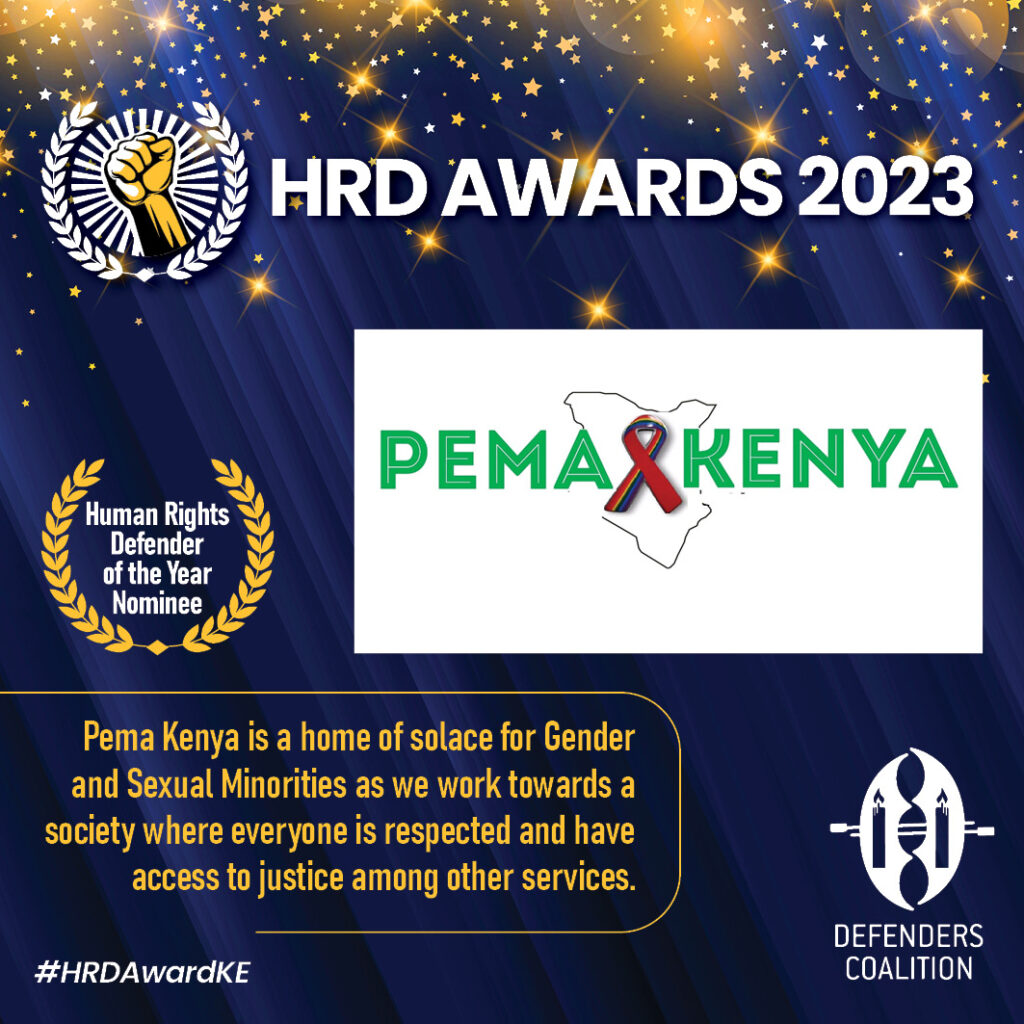
Pema is a human rights organization that works on advocating for Gender and Sexual Minorities in Kenya. Pema Kenya promotes inclusivity of Gender and Sexual Minorities (GSM) through advocacy and capacity building with a vision of a society that embraces justice and diversity. They deploy the use of biometrics and health data, community-led monitoring; Conduct health outreaches; sensitization of sub-county health facilities through various approaches like Utu barazas with the health service providers and mental health interventions on GSMs.
The primary challenges Pema and other groups advocating for GSM face is government’s policy and the social-cultural pressure. The current laws for instance, Penal Code 162, 165 is conveniently interpreted to discriminate GSMs. And there is a potential of a far more restrictive laws in the form of the draft Family Protection Bill which presents an existential challenge for Pema-Kenya and its work
Despite the challenging legal and social reality, Pema continues to deliver on critical areas.
“Pema spearheaded county-level advocacy initiatives in Mombasa County by establishing a cohort of moderators comprised of key stakeholders (police officers, health workers, local administrators, and religious leaders) who work together in one space at the institution of service delivery to create safe space within the institutions for GSM community to access services. “
Pema play a critical role in a restricted and increasingly hostile environment where the state restricts civic space through legal, policy and administrative tools, and society through cultural means.
Shikoh works to address the negative impact of ethnicity among Kenyan youth. Through Tribless Youth, Shikoh works on shifting the politics from ethnicity to one based on issues, thus promoting peaceful co-existence. The group utilizes artivism, social media engagement, and traditional communication methods. Tribeless Youth’s decentralized leadership and operational structure, broadly online, gives it an edge over the traditional formal human rights advocacy outfits.
Since the outfit Shikoh works with, the Tribless Youth, is self-organized and mobilized, they face the challenges of raising funding for some of their activities. Members have also “experienced people sent as spies to our meetings, being followed home, and intimidations from some quarters of the county in the county government.”
“One of the significant issues we have addressed is arbitrary arrests, which often target young activists advocating for a more just society. By raising awareness about these injustices and utilizing our network, we have successfully contributed to the release of unjustly detained activists and raised the profile of these issues, leading discussions towards positive changes within the legal system.”
Addressing the negative ethnicity is a positive undertaking, especially considering its impact on governance. The targeting of the youth, and the point where they spend of most of their time, on social media platforms, and through other medium that suits them is admirable.
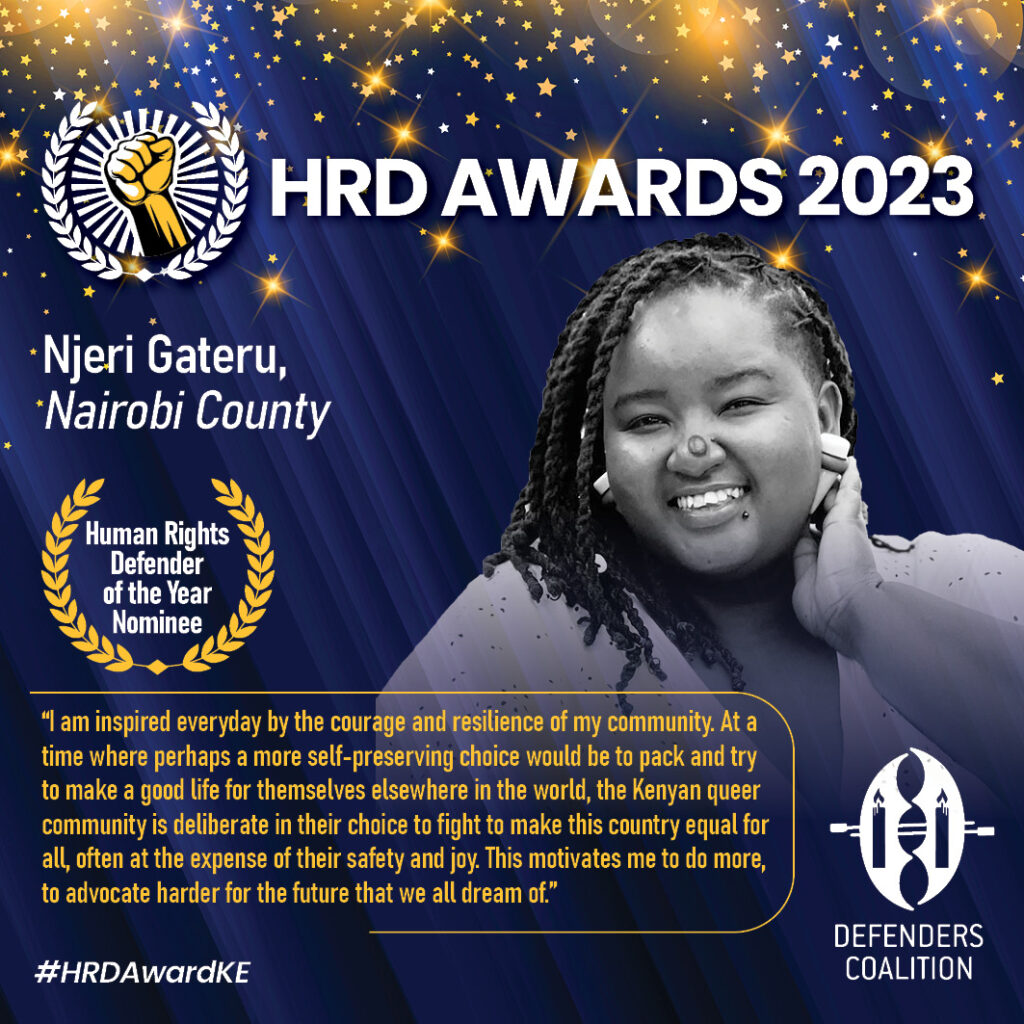
Njeri is a Human Rights Lawyer and defender working for the National Gay & Lesbian Human Rights Commission in Kenya. Njeri’s organization has been at the centers of a case that has highlighted the struggle for equality and human rights for all people with a bias towards sexual and gender minorities.
Njeri, through her organization access to justice through a free legal aid clinic for anyone who had been discriminated against or violated on the grounds of their SOGIE. Njeri also engages in strategic litigation and advocacy towards equality for LGBTIQ persons in Kenya.
The primary barrier against advocating for LBGTIQ in Kenya is equal access to rights under the current legal dispensation. Kenya still retains the colonial Penal Code that contains prohibitions on consensual adult same-sex intimacy in private. The public further confers ‘criminal’ to anyone perceived to be a sexual or gender minority due to the existence of this law.
Njeri notes: “In the last two years, I have experienced a different kind and perhaps more terrifying aggressor in the form of a Social-Cultural outfit (the Council of Gikuyu Culture) who had issued numerous threats including death threats, surveillance and a physical/automotive attack”
Despite the legal and social barriers, Njeri has notched some impressive impacts through the commission.
“In my time at NGLHRC, we have attended to over 6000 clients, trained over 1500 LGBTIQ paralegals, represented clients in over 450 cases, trained thousands of stakeholders across the governmental, private and civil society sector. NGLHRC has successfully litigated for registration of LGBTIQ organizations and ending forced anal examinations.”
Njeri’s work is essential and challenging, and she understands the formal and social costs of doing what she does, making her a worthy awardee.
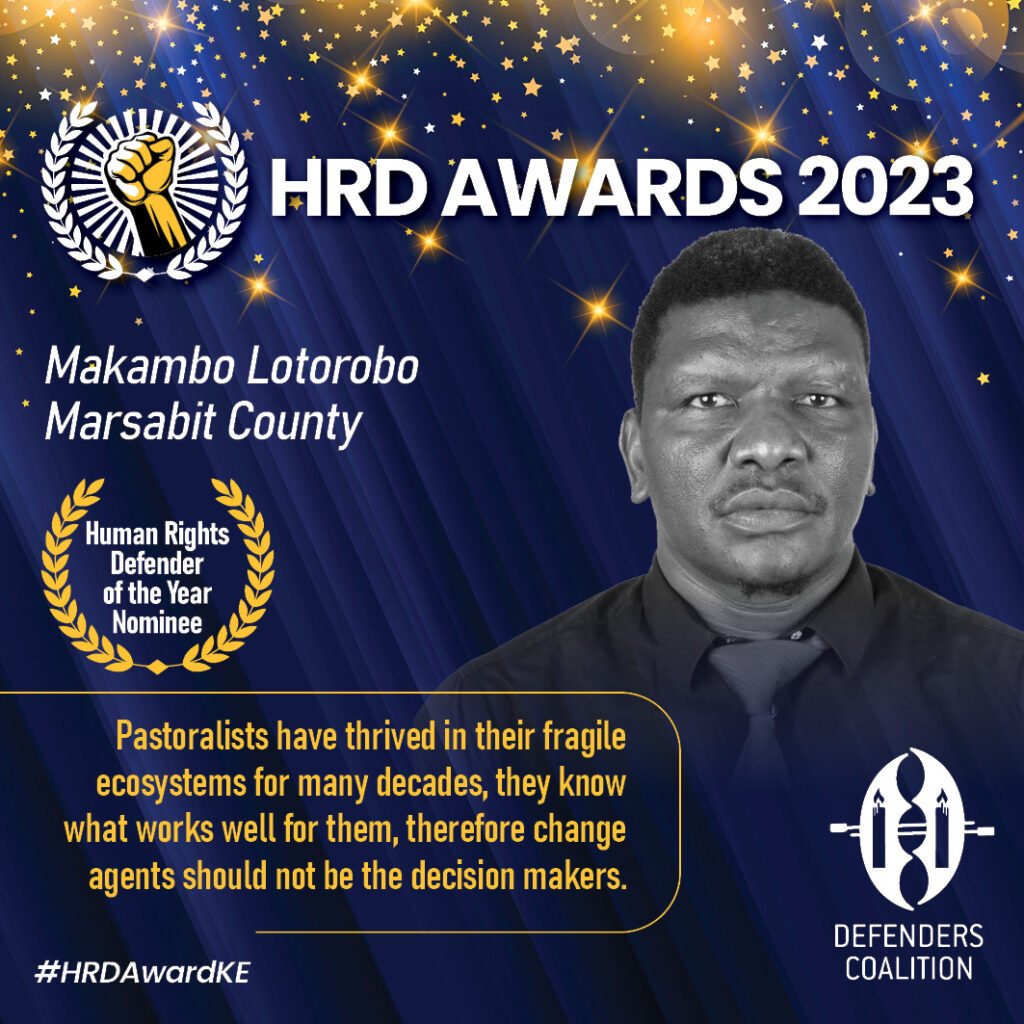
Makambo is a pastoralist land rights activist from Turkana County in North West Kenya. Makambo uses the Sarima Indigenous Peoples Land Forum (SIPLF), an organization he co-founded, to advocate for his community’s land rights in the face of large-scale infrastructures. The land is central to the pastoralists’ livelihood, and any annexation without due process disenfranchises them.
Makambo was at the center of mobilizing northern Kenya communities around the impact of the Gilgel Gibe III hydroelectric dam built on River Omo – a river that drains into Lake Turkana- by the Ethiopian government due to the fears of the dam’s impact on the populations whose livelihoods relied on Lake Turkana. Approximately, 300,000 people relied on Lake Turkana for their existence.
Additionally, Makambo was at the center of mobilizing communities from northern Kenya to protest and litigate against the grabbing of 150,000 acres of community land to establish the Lake Turkana Wind Power (LTWP) Project.
As an activist working on land rights, he is concerned with the private developer tactics of fighting back the community’s resistance. This is because the company constructed barriers along a local public road that connects South Horr to Loiyangalani. These illegal barriers by the private company on a public road facilitated monitoring the movement members, especially the most vocal posing the danger of elimination. During the construction of the LTWP any dissent was not tolerated by the company for fears that it will derail their project activities. Activists faced multiple threats from state agencies, the military, and the police. Any person seen advocating for the community in the Lake Turkana Wind Power (LTWP) was de facto deemed anti-government. The community is accustomed to the police’s intimidation and threats.
Despite the risks, Makambo has been consistently fighting the annexation of 150,000 acres, 607 km2- the size of Nairobi County to the Lake Turkana Wind Power (LTWP), a private company, without the community’s consent. They took the matter to court. The High court in Meru court ruled in favor of the community.
“…a lawsuit was filed in October 2014 at the Meru High Court, with the objective of nullifying the titles and returning the land to its original status as community land. Despite the injunction issued by the Court, President Kenyatta came in person to bulldoze our land in order to launch project construction. Among the strategies that we employed include; petitions in 2012, to funders (Follow the money) i.e; Google and Overseas Private Investors Corporation (OPIC) to withdraw support.”
Makambo is among few human rights activist fighting against the annexation of indigenous land in a marginalized pastoralist land community. The land is crucial to sustaining pastoralist livelihood, and annexing it without their consent will negatively impact their lives and livelihood.
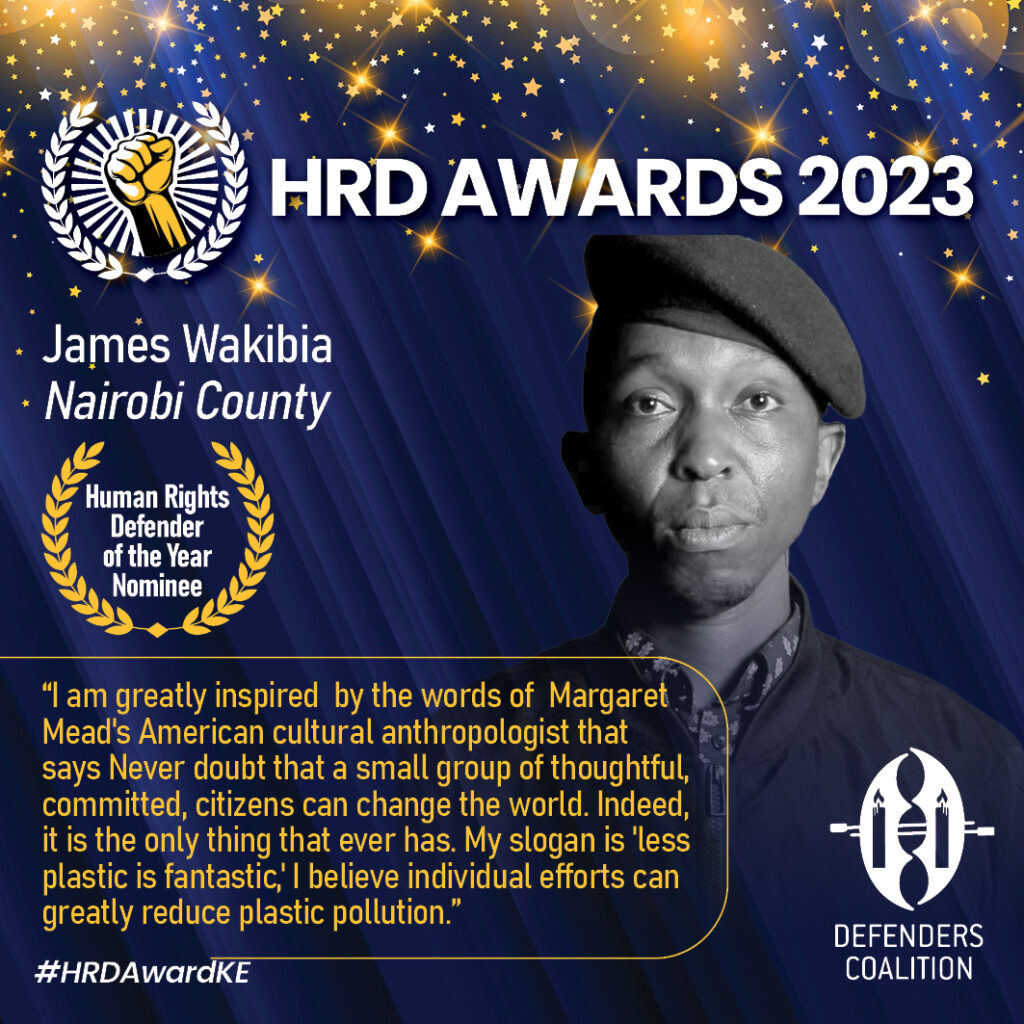
James is a human rights defender based in Nakuru who uses online media to highlight human violations in his community. His activism began when he was at school and he witnessed littering and authorities doing nothing about it thus violating the people’s fundamental human rights to a healthy environment.
Since then, he knew that something needed to be done to raise awareness and bring about change. Important to note that James has a terrific ability to draw from his own experience and observation to develop thoughtful opinions on a variety of environmental issues.
James combines his photography skills and extensive use of online platforms, especially X, formally Twitter, to mobilize and campaign on plastic environmental pollution and spotlight human rights abuse and violations, mainly when vulnerable individuals are involved. What initially started as a passion project when he was at the university has grown into a project that takes up most of his time.
While, in principle, most people favor a clean environment free of plastic, campaigning without institutional support has been difficult for James. There were many occasions when James wanted to give up, but he persisted. James also lost many opportunities because nobody wants to work with someone who can ask tough questions.
James’s persistence in his campaigns has paid off in small and big ways.
“I was also running a campaign to call for a ban on single-use plastic bags, a campaign I ran since 2013 until 2017 when eventually the minister of environment then, Prof Judi Wakhungu, banned the use, manufacture, and importation of plastic bags in Kenya. It warms my heart knowing that we have less plastic polluting the environment. My desire is that our environment will completely be free from plastics in the next decade, and I am campaigning hard for that.”
James also campaigned online for two patients detained by hospitals for outstanding medical bills; through government interventions, the hospital released the two patients.
The environment has linkages with plenty of other human rights. Linking environmental protection follows the long tradition pioneered by human rights giants like Prof. Wangari Maathai.
James believes that this award will be like new oil in an engine; it will give him the much needed fuel to keep fighting for environmental and human rights.
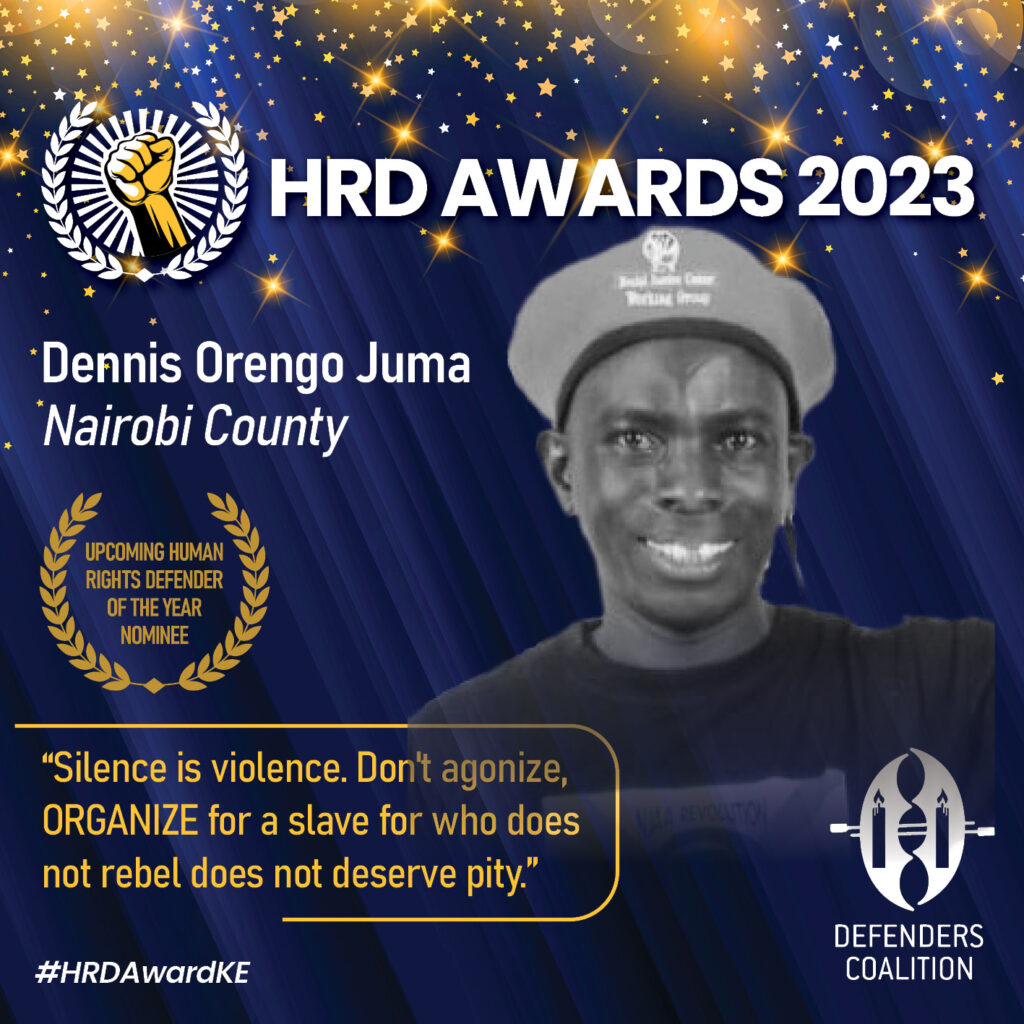
Dennis is a human rights defender working with a range of marginalized and vulnerable groups of the society. These include widows, Children, Refugees, Persons with Disabilities(PWDs) and victims of extrajudicial killings.
Specifically, Dennis volunteers to do sign language interpretation in police stations and in courts of law whenever deaf persons are in conflict with the law or have been violated so as to ensure mitigation of language barrier in the dispensation and access to justice.
Besides supporting PWDs, Dennis supports widows facing various challenges accessing justice access alternatives such as the alternative justice system. Additionally, Dennis trains the widows on paralegal skills where they can go to court and seek justice by themselves in case they are not able to afford litigation services.
Owing to the fact that Dennis works with marginalized and vulnerable groups in the community, perpetrators of violations are always keen to intimidate and silence Dennis by issuing threats. He has had to relocate severally due to an increase of threats as a result of his work.
“For my advocacy, I have faced threats which has led to at times stalling my work because I have to operate incognito or move out of the jurisdiction area where I operate. I have been forced to change houses every quarter for my safety.”
Despite the challenges, Dennis has overcome this challenge by remaining firm, consistent and upholding integrity and abiding by the rule of law at all times. This has made perpetrators lack a basis on which to discredit his service.
Scope, reach, and impact of the work
Orengo has registered a catalog of impressive policies and direct individual support for individuals whose rights were abused.
“Under the Disability Rights Advocacy, I have helped three Deaf Children who were defiled to get justice with about 10 more cases on disabled child defilement cases pending in court. I helped in documentation, filing of the cases and sign language interpretation during the court process. I also proposed 7 amendments to the Disability Bill 2023 which were all adopted by the Senate. Between 2019 to 2022, I have helped mobilize funds to buy 50 white canes to 50 visually impaired persons. I have also helped establish a disability club at St Paul’s University where I help disabled students in application of bursaries, local and international scholarships.”
Why the HRD stands out from others working on similar issues
Because of the issues he is focused on- groups that do not have plenty of advocates, and the level of success he has notched, this award will help raise his profile and enhance his further contribution.
What positive impact will this award have on your human rights work?
Dennis believes that this recognition will help enhance his safety and security by consolidating position and role in the community. He believes that the award will send a strong message to perpetrators that his work is legitimate and that he has allies across various sections of the community. He also hopes to make use of the funds from the recognition to develop a software application that supports the monitoring of human rights violations in his community.
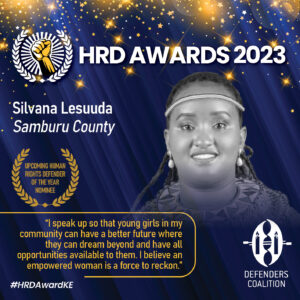
Silvana Lesuuda is a social justice activist leading Network Empowering Samburu Transformation ( NEST), a women-led organization based in Samburu County, located in Kenya’s ASAL areas and is home to pastoralists and indigenous persons characterised with largely patriarchal social and political setups.
Human Rights Issues Engaged in
In Lesuuda’s community, women’s voices continue to be suppressed, ignored, and marginalised, despite their contribution to the community.
Over the years, Lesuuda has been creating awareness and the recognition of the true role of women and girls in the community. She has been able to raise women’s voices in a community where women face a unique seat of marginalization. Lesuuda, through NEST advocates for the end of period poverty and stigma, early child marriage and fighting against harmful practices such as Female Genital Mutilation (FGM).
Scope, reach, and impact of the work
Despite working against entrenched cultural power dynamics, Lessuda has managed to score positive outcomes with a crucial constituency, the morans, against Child marriage and period poverty. She has turned some of the morans into a champion of her cause. Before her engagement, such conversations were considered taboo.
“I have succeeded in sustaining the conversation and setting the agenda against Children’s Marriages; I have led conversations on period poverty, which I now work closely with Moran men as my champions and advocates; these talks were initially considered taboo but have been accepted at the moment.”
Degree of difficulty
Lesuuda is fighting against a deeply entrenched cultural norms where power is disproportionately wielded by men, mostly old men. As a woman, that is an incredibly difficult undertaking.
Why the HRD stands out from others working on similar issues
Convincing the Morans- the centre of gravity of the community in upholding the patriarchy, and working with them as ambassadors, makes Lesuuda a worthy awardee
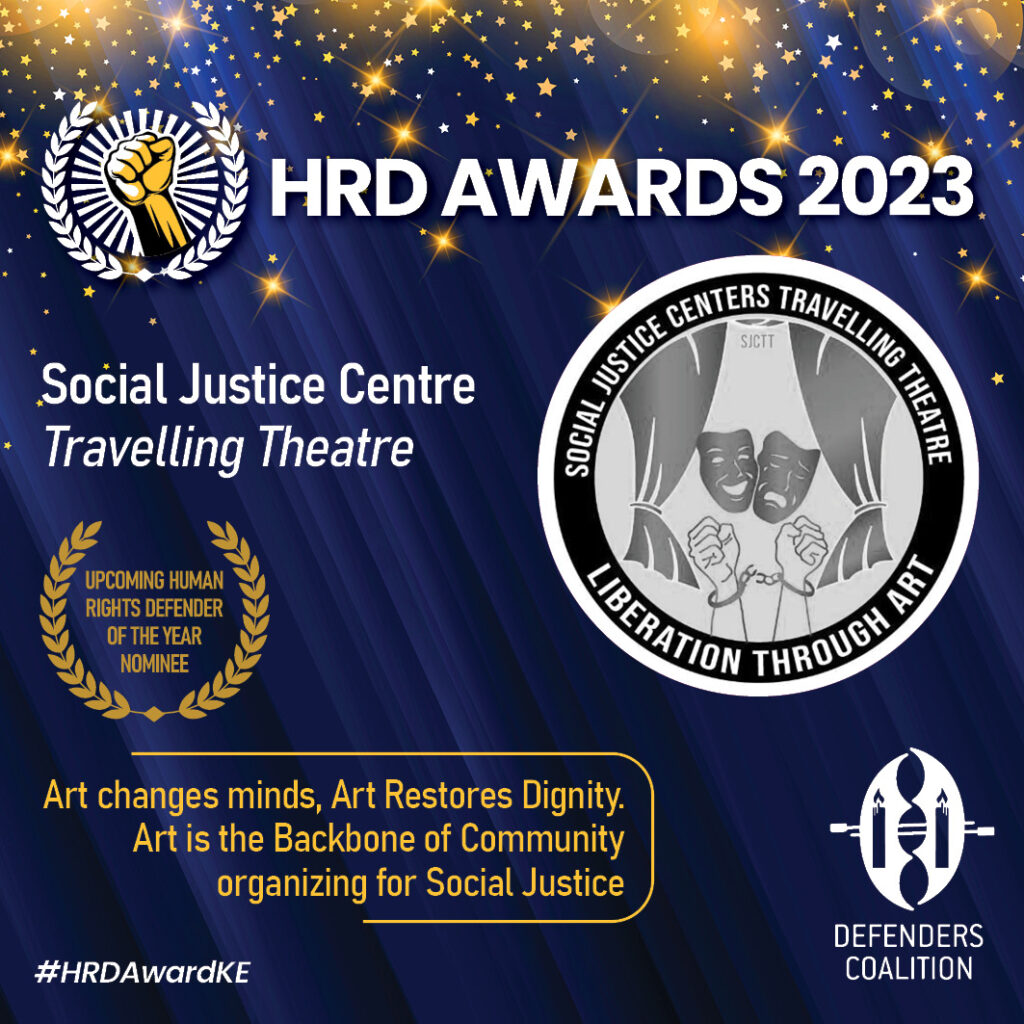 Social Justice Centers Travelling Theatre (SJCTT) is a collective of Artivist from the Social Justice Movement who use Theatre as a means of transforming society to a social just Society.
Social Justice Centers Travelling Theatre (SJCTT) is a collective of Artivist from the Social Justice Movement who use Theatre as a means of transforming society to a social just Society.
The Social Justice Centers Travelling Theatre’s (SJCTT) advocacy is shaped by its surrounding; since most of the members are from the informal settlement area, most of the human rights violation they focus on includes, Police excesses, including harassment, extortion and enforced disappearances.
The Social Justice Travelling Theatre Initiative was founded in 2019 as part of the organs of the Social Justice Movement which has been in the forefront addressing Social and Political issues affecting the Kenyan Population. The Social Justice Travelling theatre has been pioneered by young people who organize in various informal settlements in Nairobi and around the country.
It has adopted both street performances and stage performances to reach their audiences. Majority of the issues that the organ has organized against includes performances on state brutality that is prevalent in informal settlements and where majority of the members come from.
The Social Justice Movement has monitored and documented key violations involving Police harassment and Police excesses including extortion and enforced disappearances. Additionally, Social Justice Travelling Theatre pays key focus involves deconstructing normalised harmful practices such as Gender-Based Violence which is rampant in various areas in Kenya.
Degree of difficulty
Most members of the Social Justice travelling theatre come from the informal settlements, unemployed, and they depend on theatre as their form of sustenance. Raising resources for conducting performances and sustaining their membership is a big pain point for Social Justice Centers Travelling Theatre (SJCTT.
Moreover, the team has on several occasions encountered resistance from various duty bearers who perceive their work as challenging the state. This has exposed them to push backs such as illegal arrests when coming from training sessions and propagation of negative rhetoric about their work.
Scope, reach, and Impact of the Work
“The theatre as a unit has inspired the forgotten history of the theatre and has sparked a renewed hope in organizing social movements and alternative methods of organizing the community today. It has also brought together the different kinds of arts including music, poetry, spoken word and progressive cultural dance. It has also transformed aspects of community education and awareness in the sense that it has brought a different view towards mobilizing and recruiting members to the Social movements and building strong organizations in the civic and political duties.”
Why the HRD stands out from others working on Similar issues.
The innovation within this group is trailblazing in the frontier of the use of art for social change by communities. For this team, art and sports is an advocacy tool for awareness accretion as well as persuading communities to support human rights defenders in their work.
Over the years, this Social Justice Travelling theatre have successfully unpacked
numerous rights among citizens for them to remain vigilant and active in the promotion and protection of human rights. Moreover, they have evolved as talented actors, utilizing street theatre as a means to reach communities, drive campaigns, and counteract the shrinking civic space in Kenya.
The use of theatre has a rich history of human rights advocacy;I Will Marry When I Want (Ngaahika Ndeenda)is a Gikuyu play co-written by Ngũgĩ wa Mirii and Ngũgĩ wa Thiong’o. was showcased in Kenya in 1977. The government banned the playand arrested Ngugi. The use of theatre makes Social Justice Centers Travelling Theatre (SJCTT) to stand from other awardees.